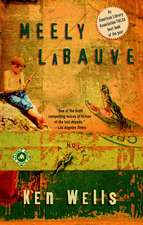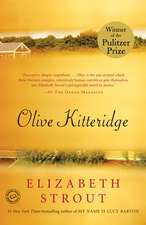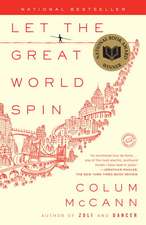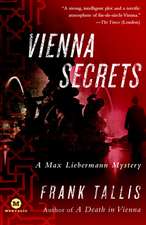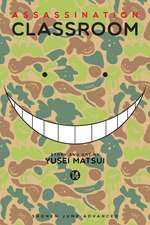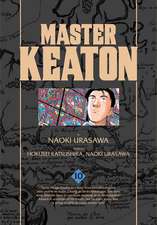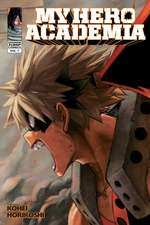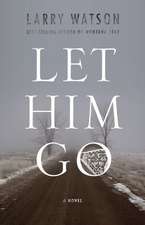Sundown, Yellow Moon
Autor Larry Watsonen Limba Engleză Paperback – 30 sep 2008
Spare, haunting, lyrical, Sundown, Yellow Moon is a piercing study of love and betrayal, grief and desire, youth and remembrance. Larry Watson not only brings to life a distinct period in history but, most affectingly, reveals the interplay of memory, secrets, and the passage of time.
Praise for Sundown, Yellow Moon:
“Watson succeeds impressively, especially in deepening our understanding of first love.”
–Alan Cheuse, Chicago Tribune
“A marvelous evocation of a time and place and of high school existence when it was considerably less ferocious than it is today . . . [Sundown, Yellow Moon] twitches aside the curtain to reveal the menace and mendacity lurking behind placid and mundane lives.”
–Minneapolis Star Tribune
“[An] oddly heartbreaking story: allowed to run amok, the past becomes a monster capable of devouring the present.”
–Booklist
“Larry Watson takes the less-traveled roads, through landscapes and heartscapes vaguely familiar, intensely poetic and always jangling. . . . He has established himself as one of the leading poetic realists, painting his stories across the canvas of interiors: small-town America and the human heart.”
–San Jose Mercury News, on Orchard
Preț: 112.52 lei
Nou
Puncte Express: 169
Preț estimativ în valută:
21.53€ • 22.40$ • 17.78£
21.53€ • 22.40$ • 17.78£
Carte tipărită la comandă
Livrare economică 14-28 aprilie
Preluare comenzi: 021 569.72.76
Specificații
ISBN-13: 9780375758539
ISBN-10: 0375758534
Pagini: 324
Dimensiuni: 134 x 203 x 19 mm
Greutate: 0.25 kg
Editura: Random House Trade
ISBN-10: 0375758534
Pagini: 324
Dimensiuni: 134 x 203 x 19 mm
Greutate: 0.25 kg
Editura: Random House Trade
Notă biografică
Larry Watson is the author of In a Dark Time, Montana 1948, Justice, White Crosses, Laura, and Orchard. He has won the Milkweed Fiction Prize, two National Endowment for the Arts fellowships, the Mountain and Plains Booksellers Association Regional Award, and numerous other literary prizes. He lives with his wife in Milwaukee, Wisconsin.
From the Hardcover edition.
From the Hardcover edition.
Extras
Chapter 1
Although I have devoted much of my life to writing stories, they are all, I have come to realize, part of a single story that has shifted and swelled over time but never strayed far from my core. I will call its beginning the January day when I was sixteen years old and walking home from school with my best friend, Gene Stoddard. We heard sirens, but we couldn’t see where they were coming from. Their combined howl, however, was so close that we believed police cars or fire trucks, and an ambulance, had to be nearby. We ran toward the sound, hoping to catch a glimpse of the vehicles and perhaps discern their destination. When we came to the Will-Moore Elementary School playground, its new snow packed and rutted to bare ground in places from the boots of hundreds of children, we saw a police cruiser and an ambulance speeding up Fourth Street. Those were the last vehicles in the procession. It was obvious we’d get no closer to them and their mystery, so we stopped, our heaving, slowing breaths fogging the frigid air. Gene and I both lived a few blocks away on Keogh Street. (Our street was in a fairly new section of Bismarck, North Dakota, and the developer’s wife, a student of history, had arranged to have some of the street names in that part of town named for the officers—Keogh, Yates, Cooke, Reno—in Custer’s command when Custer and the Seventh Cavalry left Fort Abraham Lincoln, just west of Bismarck, on their ill-fated campaign that ended at Little Bighorn.) For all of our school years Gene and I had walked to and from school in each other’s company. Recently, however, that had begun to change. We had a couple friends with cars, and one of them usually picked Gene and me up in the morning. They were both on the basketball team, however, and practices meant they stayed later at school. Also, Gene had started going steady with a sophomore girl, Marie Ryan, and he was often with her after school, but on that day she was in rehearsal for a choir concert. So we were walking together again, and we’d planned to go to his house or mine. We had to memorize the dagger speech from Macbeth for Miss Cordell’s English class, and we needed to work on our recitations. For a moment we were tempted to take a detour in an attempt to find where all those sirens were going. Their wailing seemed to have stopped, and not far away. Could they be at one of the stores at the shopping center on Third Street? At the state capitol, only a few blocks north of us on Fourth Street? Or could they have been going to a private home on one of the residential streets or avenues that surrounded us? Perhaps if we had not had that homework assignment, or if it had not been so cold—the snow underfoot squeaked when we shifted our weight—or if one of us had been allowed the use of the family car, we might have followed the trail of undulating sound that still hung in the crystalline winter air. But we did not. We turned up the collars of our wool overcoats (although this fashion would reverse itself before the decade was out, in 1961 teenagers imitated the attire of adults), pulled our stocking caps down to our eyebrows, hunched our shoulders to our necks, and moved on. Would it have mattered if we had not trudged immediately homeward? It would not. Sirens sound when deeds are done. We went to Gene’s home because it was closer, by four houses, and when we entered, we were surprised to find Gene’s father home. He was sitting at the kitchen table, smoking a cigarette, and wearing his hat and overcoat. Is it only hindsight that makes me want to say he looked gray, drawn? Cold of course leaches color from as many cheeks as it fills. “Where’s your mother?” he asked. “I’m pretty sure she works at the church library on Wednesdays.” Gene’s father—Raymond—nodded gravely. “Wednesday. That’s right. It’s Wednesday.” My discomfort grew. Raymond Stoddard was a somber, reserved man by nature, but he wasn’t usually tensely grim, as he appeared to be at that moment. That he wasn’t aware of Mrs. Stoddard’s schedule, something that the women in the other houses up and down the block would certainly know, struck me as unusual, but no more so than the fact that a seemingly healthy male was home before five o’clock. He hadn’t taken off his hat and coat, and he hadn’t greeted me in any way. And I knew from hearing my parents talk that Mr. Stoddard had once lost a job because of his drinking. I’d be willing to concede that my entire sense of unease might not have been true of the moment but was added only with the aid of hindsight, except for this fact: I didn’t remain at the Stoddards’ that day. Before I removed my own cap and coat, I made up an excuse and told Gene I couldn’t stay. Later that evening, we decided, we’d get together and practice the dagger speech on each other. At our house nothing suggested anything but the ordinary. My mother was in the kitchen moving from refrigerator to sink to cupboard to stove, preparing the evening meal and pausing only to take a drag from the Viceroy burning in the ashtray on the kitchen table. My sister, younger than me by eight years, sat on the living room floor watching cartoons and eating some kind of sweet that had already made her heavy for her age and that would lead to lifelong unhappiness over her weight. All was as it should be. The furnace was running, its constant exhalation heating the house until the insides of the windows perspired and the kitchen’s cooking smells drifted all the way to the bedrooms and back again. Warmth, food, family—it was a scene of reassuring comfort, and although I might have felt it as such, nothing about it registered itself as rare, and that I took it for granted only testifies to how few interiors I knew well. “Do you know what those sirens were about?” I asked my mother. “I was going to ask you the same thing.” “Gene and I saw an ambulance and a cop car going up Fourth Street, but there had to be more than just those two.” “Police car,” she corrected. “And two went past on Divide, too.” “Going east?” “Going east.” “There wasn’t anything on the radio?” My mother had a radio on in the kitchen from early morning until night. “Haven’t heard a thing.” “Well, if you hear anything from my room, it’s me. We have to memorize this Shakespeare speech for English, and the only way I can get it is to keep saying it out loud.” “Let me know if you want me to test you.” I went off to my room and behind its closed door paced back and forth and recited Macbeth’s words: Art thou not, fatal vision, sensible To feeling as to sight? or art thou but A dagger of the mind, a false creation, Proceeding from the heat-oppressed brain? I see thee yet, in form as palpable As this which now I draw. To this day I remember the soliloquy, although I’ve had no occasion to repeat those lines. That they’re sealed in my memory makes me believe that disaster has the power to cast not only every attendant fact in the sharpest relief but collateral details as well. Over the sound of my own voice I soon heard sirens again, though faintly at first. Because of what we had witnessed earlier, I stopped speaking and listened carefully. Their wail traveled so easily to my ears it seemed as though I could map their movement in the air—up Fourth Street again, west on Divide Avenue, closer, closer, until they were right there. I jumped to my window in time to see one police car and then another slide around the corner and career down our street. Their lights sliced through the early evening dusk and tinged the snowbanks and the houses on the block a pale, pulsing red. That same light found its way into our home, its presence a violation. In other parts of the city did they hear the sirens and calculate that they came from our block? I ran to the living room, from whose windows I could see farther down the street. I didn’t have to look far. Both cruisers pulled awkwardly to the curb in front of . . . the Stoddards’? Was that possible? Even more improbable was the car already parked there. In the driveway, right behind Raymond Stoddard’s dark blue Ford Galaxie was an emerald-green Nash Rambler. If anyone in town owned a Nash in that same color other than my father, I didn’t know about it. Surely there had been other moments in my life when I had been immobilized by conflicting impulses, but that was the first time I was aware of it. I was caught between the desire to flee back into the interior of our house, back to where those lights couldn’t touch me or those sirens reach me, and a wish to run in the other direction—out of the house, across the drifted lawns and the snow-packed street, and down the block to where the real invasion was taking place, to my best friend’s house. But perhaps it was confusion that truly paralyzed me. Dad’s car? In recalling the events of that and subsequent days, I’m sometimes unsure about chronology, about what occurred before or after. In part, that uncertainty is a consequence of how I’ve learned about the events—often in fragments—and my own version of what happened is a patchwork (although no less accurate for that). Scenes and realizations have been stitched together, sometimes overlapping one another, as I have made, and occasionally revised, my discoveries over time. About the order of days and hours I’m generally confident, but occasionally the seconds or minutes jump ahead or behind one another. For example, I have the impression that my mother came to the window too, and as she was looking over my shoulder, I asked her why Dad’s car was there, but before she could answer me, the phone rang and she ran to pick it up. After a brief conversation, she came back to the window and said, “That was your father. He said neither you nor your sister is to go outside. Do you hear? You’re to stay in the house.” But in truth, the phone had already rung, and my mother had talked to my father for a few minutes, long enough for him to give her a brief account of why he was at the Stoddards’ and why the police would be there soon. True, he told my mother to keep my sister and me in the house, but his real concern was that neither of us go anywhere near the Stoddards’, no matter how hard the obligations of friendship or the temptations of curiosity tried to move us out the door. He had instructed my mother to stay home as well, or at least until he phoned again or until she saw Mrs. Stoddard return home, and then she was to come running. I could continue to withhold information, revealing it only in slivers and shards, and in that way try to duplicate in these pages the suspense that I lived through that night, and in the process induce in you the apprehension and uncertainty that I felt, but while that might be effective narrative strategy, it would not be entirely true to the situation. I don’t recall exactly how or when I came to know what had happened in our city and our neighborhood, because to this day I am still augmenting the story, though more now with human understanding than with factual details. Nevertheless, when I finally went to bed, it was with sufficient knowledge—sufficient but incomplete—to allow me to fall asleep without being totally bedeviled by questions. This much I knew: True to one of Gene and my guesses, those sirens had been heading toward the state capitol, only a few blocks from our homes on Keogh Street. I had been in and out of the capitol building so often over the years—on my own or with school groups, with relatives and friends who came to visit—that I knew its architecture and floor plan almost as well as I knew my school’s, the public library’s, or the civic auditorium’s. I had no difficulty picturing the setting for the afternoon’s incident. In the capitol, both the senate and the house were in the legislative wing, an impressive high-ceilinged, wood-paneled, art-deco-inspired hall. Right outside the legislative chambers were upholstered banquettes, intended no doubt as places where the senators and representatives could meet, during session breaks, with lobbyists and constituents. In January 1961, the legislature was in session (worth noting because to this day North Dakota’s senate and house convene only every other year), and during a recess Monty Burnham, a popular, charismatic senator from Wembley, in Cleave County in the north central part of the state, sat on one of those padded benches in the hall. At Senator Burnham’s side was John Ritterbush, a Fargo attorney. While the two men conferred, a lean, swarthy man approached them, reached into his overcoat pocket, and brought out a pistol. Without discussion or warning, he fired at Senator Burnham. The bullet struck the senator in the chest. Burnham tried to rise from the bench, but failed and slid to the marble floor. While he lay there, the gunman shot him again. This bullet went through Monty Burnham’s throat. Ritterbush was not a target, but he was injured slightly when a fragment of either lead or stone struck him in the cheek. The senator’s wounds were mortal, and while he lay dying on the floor of the capitol’s Great Hall, the gunman calmly walked away, exiting the building through a revolving door on the south side of the building. The fact that a weapon was in his possession may have kept anyone from trying to detain him. There were many witnesses to the shooting and its immediate aftermath, and in spite of the inevitable confusion and panic, it was not long before someone volunteered an identification of the man in the overcoat. He was recognized as an employee of the North Dakota Department of Accounts and Purchases, whose offices were on the sixth floor of the capitol. His name was Raymond Stoddard. Considering the span between the time when the shooting occurred and when Gene and I saw his father, Mr. Stoddard must have driven directly home after leaving the capitol.
From the Hardcover edition.
Although I have devoted much of my life to writing stories, they are all, I have come to realize, part of a single story that has shifted and swelled over time but never strayed far from my core. I will call its beginning the January day when I was sixteen years old and walking home from school with my best friend, Gene Stoddard. We heard sirens, but we couldn’t see where they were coming from. Their combined howl, however, was so close that we believed police cars or fire trucks, and an ambulance, had to be nearby. We ran toward the sound, hoping to catch a glimpse of the vehicles and perhaps discern their destination. When we came to the Will-Moore Elementary School playground, its new snow packed and rutted to bare ground in places from the boots of hundreds of children, we saw a police cruiser and an ambulance speeding up Fourth Street. Those were the last vehicles in the procession. It was obvious we’d get no closer to them and their mystery, so we stopped, our heaving, slowing breaths fogging the frigid air. Gene and I both lived a few blocks away on Keogh Street. (Our street was in a fairly new section of Bismarck, North Dakota, and the developer’s wife, a student of history, had arranged to have some of the street names in that part of town named for the officers—Keogh, Yates, Cooke, Reno—in Custer’s command when Custer and the Seventh Cavalry left Fort Abraham Lincoln, just west of Bismarck, on their ill-fated campaign that ended at Little Bighorn.) For all of our school years Gene and I had walked to and from school in each other’s company. Recently, however, that had begun to change. We had a couple friends with cars, and one of them usually picked Gene and me up in the morning. They were both on the basketball team, however, and practices meant they stayed later at school. Also, Gene had started going steady with a sophomore girl, Marie Ryan, and he was often with her after school, but on that day she was in rehearsal for a choir concert. So we were walking together again, and we’d planned to go to his house or mine. We had to memorize the dagger speech from Macbeth for Miss Cordell’s English class, and we needed to work on our recitations. For a moment we were tempted to take a detour in an attempt to find where all those sirens were going. Their wailing seemed to have stopped, and not far away. Could they be at one of the stores at the shopping center on Third Street? At the state capitol, only a few blocks north of us on Fourth Street? Or could they have been going to a private home on one of the residential streets or avenues that surrounded us? Perhaps if we had not had that homework assignment, or if it had not been so cold—the snow underfoot squeaked when we shifted our weight—or if one of us had been allowed the use of the family car, we might have followed the trail of undulating sound that still hung in the crystalline winter air. But we did not. We turned up the collars of our wool overcoats (although this fashion would reverse itself before the decade was out, in 1961 teenagers imitated the attire of adults), pulled our stocking caps down to our eyebrows, hunched our shoulders to our necks, and moved on. Would it have mattered if we had not trudged immediately homeward? It would not. Sirens sound when deeds are done. We went to Gene’s home because it was closer, by four houses, and when we entered, we were surprised to find Gene’s father home. He was sitting at the kitchen table, smoking a cigarette, and wearing his hat and overcoat. Is it only hindsight that makes me want to say he looked gray, drawn? Cold of course leaches color from as many cheeks as it fills. “Where’s your mother?” he asked. “I’m pretty sure she works at the church library on Wednesdays.” Gene’s father—Raymond—nodded gravely. “Wednesday. That’s right. It’s Wednesday.” My discomfort grew. Raymond Stoddard was a somber, reserved man by nature, but he wasn’t usually tensely grim, as he appeared to be at that moment. That he wasn’t aware of Mrs. Stoddard’s schedule, something that the women in the other houses up and down the block would certainly know, struck me as unusual, but no more so than the fact that a seemingly healthy male was home before five o’clock. He hadn’t taken off his hat and coat, and he hadn’t greeted me in any way. And I knew from hearing my parents talk that Mr. Stoddard had once lost a job because of his drinking. I’d be willing to concede that my entire sense of unease might not have been true of the moment but was added only with the aid of hindsight, except for this fact: I didn’t remain at the Stoddards’ that day. Before I removed my own cap and coat, I made up an excuse and told Gene I couldn’t stay. Later that evening, we decided, we’d get together and practice the dagger speech on each other. At our house nothing suggested anything but the ordinary. My mother was in the kitchen moving from refrigerator to sink to cupboard to stove, preparing the evening meal and pausing only to take a drag from the Viceroy burning in the ashtray on the kitchen table. My sister, younger than me by eight years, sat on the living room floor watching cartoons and eating some kind of sweet that had already made her heavy for her age and that would lead to lifelong unhappiness over her weight. All was as it should be. The furnace was running, its constant exhalation heating the house until the insides of the windows perspired and the kitchen’s cooking smells drifted all the way to the bedrooms and back again. Warmth, food, family—it was a scene of reassuring comfort, and although I might have felt it as such, nothing about it registered itself as rare, and that I took it for granted only testifies to how few interiors I knew well. “Do you know what those sirens were about?” I asked my mother. “I was going to ask you the same thing.” “Gene and I saw an ambulance and a cop car going up Fourth Street, but there had to be more than just those two.” “Police car,” she corrected. “And two went past on Divide, too.” “Going east?” “Going east.” “There wasn’t anything on the radio?” My mother had a radio on in the kitchen from early morning until night. “Haven’t heard a thing.” “Well, if you hear anything from my room, it’s me. We have to memorize this Shakespeare speech for English, and the only way I can get it is to keep saying it out loud.” “Let me know if you want me to test you.” I went off to my room and behind its closed door paced back and forth and recited Macbeth’s words: Art thou not, fatal vision, sensible To feeling as to sight? or art thou but A dagger of the mind, a false creation, Proceeding from the heat-oppressed brain? I see thee yet, in form as palpable As this which now I draw. To this day I remember the soliloquy, although I’ve had no occasion to repeat those lines. That they’re sealed in my memory makes me believe that disaster has the power to cast not only every attendant fact in the sharpest relief but collateral details as well. Over the sound of my own voice I soon heard sirens again, though faintly at first. Because of what we had witnessed earlier, I stopped speaking and listened carefully. Their wail traveled so easily to my ears it seemed as though I could map their movement in the air—up Fourth Street again, west on Divide Avenue, closer, closer, until they were right there. I jumped to my window in time to see one police car and then another slide around the corner and career down our street. Their lights sliced through the early evening dusk and tinged the snowbanks and the houses on the block a pale, pulsing red. That same light found its way into our home, its presence a violation. In other parts of the city did they hear the sirens and calculate that they came from our block? I ran to the living room, from whose windows I could see farther down the street. I didn’t have to look far. Both cruisers pulled awkwardly to the curb in front of . . . the Stoddards’? Was that possible? Even more improbable was the car already parked there. In the driveway, right behind Raymond Stoddard’s dark blue Ford Galaxie was an emerald-green Nash Rambler. If anyone in town owned a Nash in that same color other than my father, I didn’t know about it. Surely there had been other moments in my life when I had been immobilized by conflicting impulses, but that was the first time I was aware of it. I was caught between the desire to flee back into the interior of our house, back to where those lights couldn’t touch me or those sirens reach me, and a wish to run in the other direction—out of the house, across the drifted lawns and the snow-packed street, and down the block to where the real invasion was taking place, to my best friend’s house. But perhaps it was confusion that truly paralyzed me. Dad’s car? In recalling the events of that and subsequent days, I’m sometimes unsure about chronology, about what occurred before or after. In part, that uncertainty is a consequence of how I’ve learned about the events—often in fragments—and my own version of what happened is a patchwork (although no less accurate for that). Scenes and realizations have been stitched together, sometimes overlapping one another, as I have made, and occasionally revised, my discoveries over time. About the order of days and hours I’m generally confident, but occasionally the seconds or minutes jump ahead or behind one another. For example, I have the impression that my mother came to the window too, and as she was looking over my shoulder, I asked her why Dad’s car was there, but before she could answer me, the phone rang and she ran to pick it up. After a brief conversation, she came back to the window and said, “That was your father. He said neither you nor your sister is to go outside. Do you hear? You’re to stay in the house.” But in truth, the phone had already rung, and my mother had talked to my father for a few minutes, long enough for him to give her a brief account of why he was at the Stoddards’ and why the police would be there soon. True, he told my mother to keep my sister and me in the house, but his real concern was that neither of us go anywhere near the Stoddards’, no matter how hard the obligations of friendship or the temptations of curiosity tried to move us out the door. He had instructed my mother to stay home as well, or at least until he phoned again or until she saw Mrs. Stoddard return home, and then she was to come running. I could continue to withhold information, revealing it only in slivers and shards, and in that way try to duplicate in these pages the suspense that I lived through that night, and in the process induce in you the apprehension and uncertainty that I felt, but while that might be effective narrative strategy, it would not be entirely true to the situation. I don’t recall exactly how or when I came to know what had happened in our city and our neighborhood, because to this day I am still augmenting the story, though more now with human understanding than with factual details. Nevertheless, when I finally went to bed, it was with sufficient knowledge—sufficient but incomplete—to allow me to fall asleep without being totally bedeviled by questions. This much I knew: True to one of Gene and my guesses, those sirens had been heading toward the state capitol, only a few blocks from our homes on Keogh Street. I had been in and out of the capitol building so often over the years—on my own or with school groups, with relatives and friends who came to visit—that I knew its architecture and floor plan almost as well as I knew my school’s, the public library’s, or the civic auditorium’s. I had no difficulty picturing the setting for the afternoon’s incident. In the capitol, both the senate and the house were in the legislative wing, an impressive high-ceilinged, wood-paneled, art-deco-inspired hall. Right outside the legislative chambers were upholstered banquettes, intended no doubt as places where the senators and representatives could meet, during session breaks, with lobbyists and constituents. In January 1961, the legislature was in session (worth noting because to this day North Dakota’s senate and house convene only every other year), and during a recess Monty Burnham, a popular, charismatic senator from Wembley, in Cleave County in the north central part of the state, sat on one of those padded benches in the hall. At Senator Burnham’s side was John Ritterbush, a Fargo attorney. While the two men conferred, a lean, swarthy man approached them, reached into his overcoat pocket, and brought out a pistol. Without discussion or warning, he fired at Senator Burnham. The bullet struck the senator in the chest. Burnham tried to rise from the bench, but failed and slid to the marble floor. While he lay there, the gunman shot him again. This bullet went through Monty Burnham’s throat. Ritterbush was not a target, but he was injured slightly when a fragment of either lead or stone struck him in the cheek. The senator’s wounds were mortal, and while he lay dying on the floor of the capitol’s Great Hall, the gunman calmly walked away, exiting the building through a revolving door on the south side of the building. The fact that a weapon was in his possession may have kept anyone from trying to detain him. There were many witnesses to the shooting and its immediate aftermath, and in spite of the inevitable confusion and panic, it was not long before someone volunteered an identification of the man in the overcoat. He was recognized as an employee of the North Dakota Department of Accounts and Purchases, whose offices were on the sixth floor of the capitol. His name was Raymond Stoddard. Considering the span between the time when the shooting occurred and when Gene and I saw his father, Mr. Stoddard must have driven directly home after leaving the capitol.
From the Hardcover edition.
Recenzii
“Watson succeeds impressively, especially in deepening our understanding of first love.”
–Alan Cheuse, Chicago Tribune
“A marvelous evocation of a time and place and of high school existence when it was considerably less ferocious than it is today . . . [Sundown, Yellow Moon] twitches aside the curtain to reveal the menace and mendacity lurking behind placid and mundane lives.”
–Minneapolis Star Tribune
“[An] oddly heartbreaking story: allowed to run amok, the past becomes a monster capable of devouring the present.”
–Booklist
–Alan Cheuse, Chicago Tribune
“A marvelous evocation of a time and place and of high school existence when it was considerably less ferocious than it is today . . . [Sundown, Yellow Moon] twitches aside the curtain to reveal the menace and mendacity lurking behind placid and mundane lives.”
–Minneapolis Star Tribune
“[An] oddly heartbreaking story: allowed to run amok, the past becomes a monster capable of devouring the present.”
–Booklist
Descriere
One day in 1961, the father of the narrator's best friend had shot a state senator and then killed himself. Naturally, the question of why becomes the talk of the town, but it is much more than that for the narrator, in this piercing study of love and betrayal, grief and desire, youth and remembrance.

